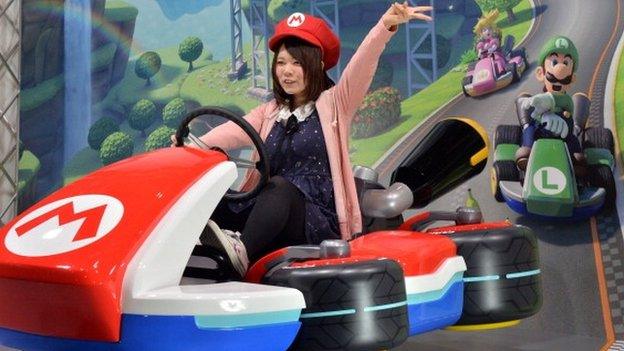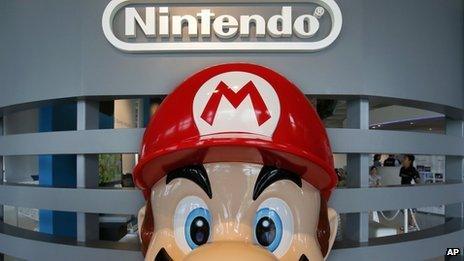Nintendo says 'No' to gay game characters
- Published

The game features a cast of "Mii" characters or personalised avatars of real players
Nintendo has said it will not allow gamers to play as gay characters in its life-simulation game Tomodachi Life.
A fan had launched a social media campaign urging Nintendo to allow same-sex relationships between characters in the game - modelled after real people.
Nintendo said it "never intended to make any form of social commentary" with the launch of the game.
Tomodachi Life has been a big hit in Japan and the firm is set to launch the game in the US and Europe in June.
"The relationship options in the game represent a playful alternate world rather than a real-life simulation," Nintendo of America Inc, said in a statement.
"We hope that all of our fans will see that Tomodachi Life was intended to be a whimsical and quirky game, and that we were absolutely not trying to provide social commentary."
Missing out?
Tomodachi Life is one of the best-selling games, external on Nintendo's handheld 3DS gaming console.
The game, which was released in Japan last year, features a cast of "Mii" characters - personalised avatars of real players - living on a virtual island.
It allows users to populate their island with the "Mii characters of family, friends or anyone else you can think of".
Tye Marini, a gay 23-year old Nintendo fan from Arizona, had launched a campaign urging Nintendo, external to allow same-sex relationships.
He claimed that since his virtual avatar was not able to marry in the game, he would miss out on "exclusive content".
"I want to be able to marry my real-life fiance's Mii, but I can't do that," Mr Marini was quoted as saying by the Associated Press news agency.
"My only options are to marry some female Mii, to change the gender of either my Mii or my fiance's Mii or to completely avoid marriage altogether and miss out on the exclusive content that comes with it."
Same code
AP quoted Mr Marini as saying that same-sex relationships were "more of an issue for this game because the characters are supposed to be a representation of your real life".
"You import your personalised characters into the game. You name them. You give them a personality. You give them a voice. They just can't fall in love if they're gay."
Meanwhile, Nintendo said "the ability for same-sex relationships to occur in the game was not part of the original game that launched in Japan".
"That game is made up of the same code that was used to localise it for other regions outside of Japan."
It said it had heard and "thoughtfully considered" all the responses posted on the campaign.
"We will continue to listen and think about the feedback. We're using this as an opportunity to better understand our consumers and their expectations of us."
New console
In a separate development, Nintendo's chief executive, Satoru Iwata, said the firm was looking to introduce a new game console for emerging markets.
The console, expected to be launched as early as next year, would be targeted towards consumers with lower incomes and less gaming experience, Mr Iwata told the Reuters news agency, external.
Emerging markets, such as China, are seen as key growth areas for game console makers.
Last month, Microsoft announced that its Xbox One console would go on sale in mainland China in September.
It is the first foreign company to announce the sale of consoles in the country after Beijing lifted a ban on such products in January.
Most analysts expect other console makers to follow.
- Published7 May 2014

- Published30 January 2014

- Published29 January 2014
